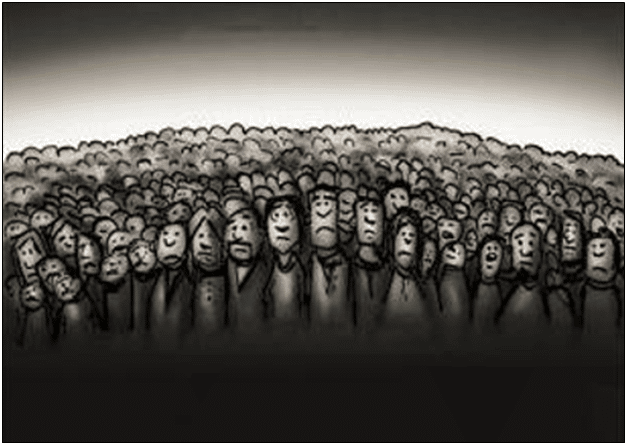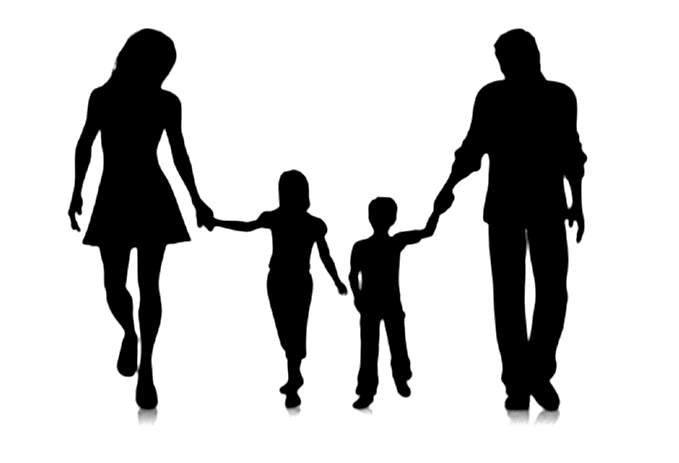September 11, 2023
Permission to republish original opeds and cartoons granted.
America’s fertility crisis will only worsen with the college gender gap as U.S. follows Japan
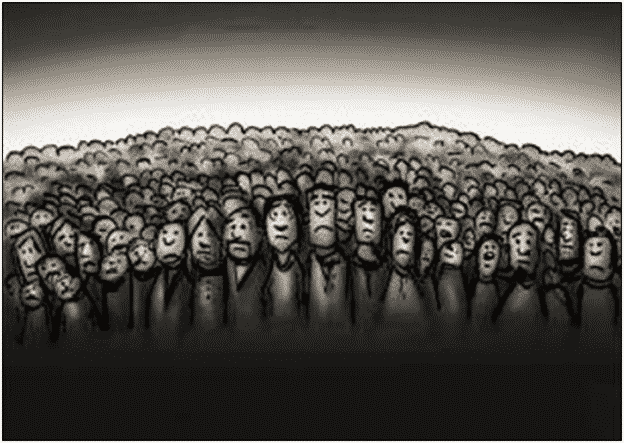
By Robert Romano
Declining fertility in advanced economies is nothing new. Since birth control was approved by the Food and Drug Administration in 1960, at the same time more women were entering the labor force and attending higher education, amid higher inflation, greater unemployment and a weaker economy, birth rates have plummeted significantly, from 3.65 babies per woman in 1959 to 1.73 by 1976, according to World Bank and Bureau of Labor Statistics data.
In the 1980s, as the Great Inflation of the 1970s and early 1980s — brought in large part by a massive uptick in demand by post-World War II Baby Boomers who were entering the labor force, marrying, settling down and purchasing homes at roughly the same time — subsided, so too did fertility rates improve, finally getting back above 2 babies per woman in 1989 and staying there on average until 2009, when the global financial crisis and the Great Recession struck.
Then, fertility again plummeted, even amid lower inflation, albeit higher unemployment, as Millennials made their way through college. But even after the unemployment of the Great Recession had subsided, fertility still kept dropping despite a good economy during the second term of Obama administration and only term of the Trump administration. What changed?
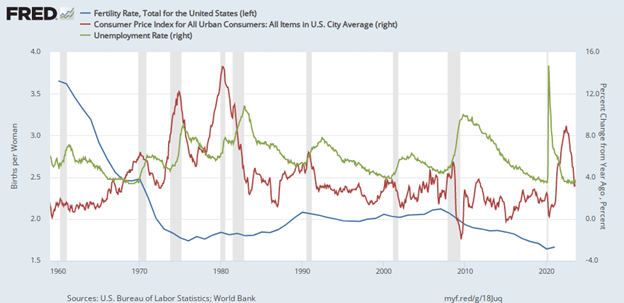
Men and women are not getting married as much. In 1960, the marriage rate for men was 69 percent and 66 percent for women and began plummeting in a continued decades long slump. In 2022, the marriage rate for men was 51 percent and for women 49 percent. Less couples equals less children.
Here, a significant, highly related factor is the level of educational attainment, according to the latest data from the Bureau of Labor Statistics, where a massive gender gap has emerged.
76 million women attended college, including 16.75 million with some college, 12.6 million with associate’s degrees, 28.2 million with bachelor’s degrees and 18.4 million with master’s degrees or above.
Comparatively, only 67.9 million men have attended college, including 16.1 million with some college, 10.87 million with associate’s degrees, 25.25 million with bachelor’s degrees and 15.75 million with master’s degrees or above.
Whereas, there are 42.8 million men who have not gone to college compared with 40.7 million women who have not gone to college. But that’s a shrinking population as Baby Boomers pass away.
As a result, 65 percent of working aged women have attended college at some level, compared with 61.3 percent of men, a trend that is only widening. Recent enrollees to four-year colleges are 1.3 to 1 female to male as of 2019, according to Oksana Leukhina and Amy Smaldone of the Federal Reserve Bank of St. Louis. That’s 56.5 percent to 43.5 percent, female to male in higher education, disproportionate compared to national data, where women make up roughly 52 percent of the population compared to 48 percent for men.
The end result of the gender gap in higher education is women who attend school are less likely to meet their future husbands. This makes decisions to postpone marriage and child-rearing more likely, on top of all the other factors. 76 women attended college or above, versus 67.9 million men. That’s about 8 million potential marriages that never were.
Similarly, men who do not attend college appear to be finding it more difficult to connect with women who did attend college, who may have a preference for men who did attend or who graduated.
This could largely be a financial decision, since higher levels of educational attainment correlate strongly with significantly higher levels of income and lower levels of unemployment, according to Bureau of Labor Statistics data. Even if a hypothetical college graduate female married a no-college male, would it make as much sense for the female to go on maternity leave, resulting in a drop in household income?

The Covid recession only made things worse, with unemployment skyrocketing as 25 million Americans temporarily lost their jobs and fertility hit 1.64 in 2020, barely recovering to 1.66 in 2021 as inflation began creeping up. 2022 might not prove to be any better as inflation peaked at 9.1 percent in June 2022 as couples who are together forestall child-rearing or cancel it altogether.
Ironically, both political parties benefit from this outcome — even if the nation may not as the U.S. goes the way of Japan with lower fertility (where it has reached 1.3 babies per woman), lower economic growth, and eventually, population decline with potential deflation and depression looming when downturns do occur — with Democrats having a strong political interest in women attending college, and Republicans having a strong political interest in men not attending college. Both parties' messaging in favor and against higher education, respectively, is reflected in these outcomes.
College graduates (51 percent) and those with advanced degrees (62 percent) are more likely to vote Democratic, according to the 2020 CNN exit poll, whereas no-college (54 percent) and associate degrees (50 percent) tending to vote more Republican on the margins.
It breaks down according to race and gender. So, white male graduates vote more Republican, 51 percent to 48 percent, whereas white female graduates vote more Democratic, 54 percent. Minorities vote overwhelmingly Democratic either way, regardless of educational attainment, about 70 percent to 30 percent. And white, no-college degree votes overwhelmingly Republican: 70 to 28 percent for men and 63 percent to 36 percent for women.
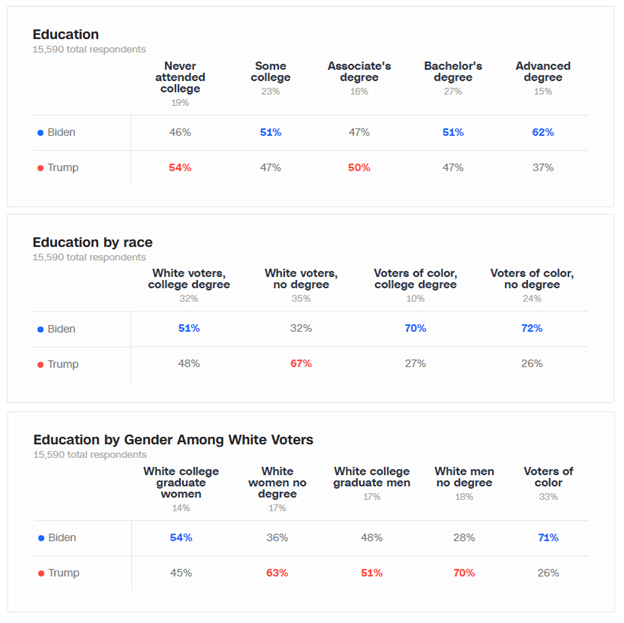
But way more women than men go to school, and Republicans are more likely to reject universities, which likely weighs on these outcomes. That is to say, if more Republicans, particularly Republican males, attended college, Democrats’ advantage among college graduates might suffer as the sample normalized. They aren’t, for what it’s worth, and so the gender gap will continue widening.
Overall, with nearly two-thirds (and rising) of women attending college, no-college men could be counting themselves out of the gene pool as dating prospects dwindle through child-rearing ages, even if the ones who do marry will tend to repopulate at higher rates (there is an inverse relationship between income and fertility) but not enough to offset enough to offset the men who don’t get married and the college-educated women who wind up alone, too, driving down fertility further. These no-college men might not be burdened with student loan debt, and so financially it could make sense, but there appears to be a greater risk of winding up alone and without a family to care for.
Robert Romano is the Vice President of Public Policy at Americans for Limited Government Foundation.
To view online: https://dailytorch.com/2023/09/americas-fertility-crisis-will-only-worsen-with-the-college-gender-gap-as-u-s-follows-japan/
Video: Sen. Lindsey Graham Responds to Breaking News from Fulton County, Georgia Grand Jury Vote To Recommend Charges For Him

To view online: https://www.youtube.com/watch?v=nA5NzhA3Y-o
Video: Texas Governor Responds To Biden’s Outrageous Plan To House Illegal Immigrants In Texas

To view online: https://www.youtube.com/watch?v=lnXXMI3V-0Y
Video: Trump On Grand Jury Targeting Graham: ‘They Wanted To Indict Anybody Who Happened To Be Breathing’

To view online: https://www.youtube.com/watch?v=hCZ4-EL2sV8
Are Parents the Most ‘Destabilizing’ and Controversial Group in America? The Left is Worried They Could be.
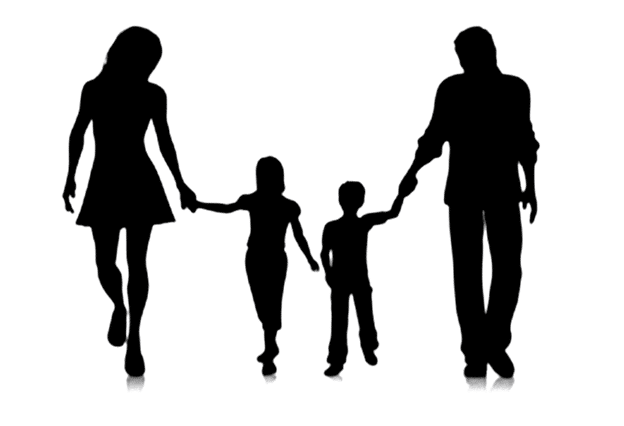
By Manzanita Miller
Parents, particularly of young children, have had a spotlight on them ever since the pandemic’s severe lockdowns and restrictions upended education, social life, and the careers of millions of families for years.
From states like California under Gov. Newsom’s seemingly endless series of lockdowns to states like Florida where Gov. DeSantis pushed for a curriculum-overhaul, parents have become a political force to be reckoned with.
Mothers and fathers of young children are finding their voices against draconian lockdowns, mask mandates, and school closures as well as taking vocal stands against left-wing educational agendas, the inappropriate sexualization of children, and unjust and unlawful college admissions practices.
Parents and their troubling drift toward the right is only starting to catch the attention of the mainstream news and beltway circle but it will certainly accelerate. Last August, the New York Times did an expose into the “destabilizing” world of anti-mask and anti-vaccine parents at rallies in California.
Covering a protest in Orinda, CA, last fall, Sheera Frenkel wrote, “Ms. Longnecker and her fellow objectors are part of a potentially destabilizing new movement: parents who joined the anti-vaccine and anti-mask cause during the pandemic, narrowing their political beliefs to a single-minded obsession over those issues.”
Frenkel noted that in interviews, 27 parents who identified as anti-mask and anti-vaccine described the path that led them to their current political views. “They said they had experienced alarm about their children during pandemic quarantines. They pushed to reopen schools and craved normalcy. They became angry, blaming lawmakers for the disruption to their children’s lives”, Frenkel wrote.
New research on parent’s views since the covid-19 pandemic reveal the pandemic – and more importantly the responses of politicians and governments to the pandemic – have upended political allegiances and largely eroded support for Democrats and far-left policies.
YouGov researchers collected data from 1,000 voters to see how the pandemic affected their political views, and the results reveal parents were one of the hardest-hit groups in the United States. Lockdowns, mask mandates and remote learning eroded support for Biden and left-wing policies even among those who voted for him in 2020.
YouGov’s research shows that parents of school-age children supported Trump by a five-percentage-point margin, 34% to 29%, while voters without children or with grown children collectively supported Biden by a six-percentage point margin, 37% to 31% margin. This makes parents of school-age children a group of particular interest for both parties heading into the next presidential election.
The research also shows that parents of school-age children are less likely to support Democrat-favored responses to future pandemics, like mask and vaccine mandates, bans on group events, and compelled remote-schooling, than those without school-aged children.
YouGov notes that over half of Americans would favor these restrictions and mandates, but parents of school-age children are between 4 and 11 percentage points less likely to support these actions than those without children.
For example, while 50% of U.S. adults without young children would support requiring vaccination, far fewer – 39% – of parents with school-age children would.
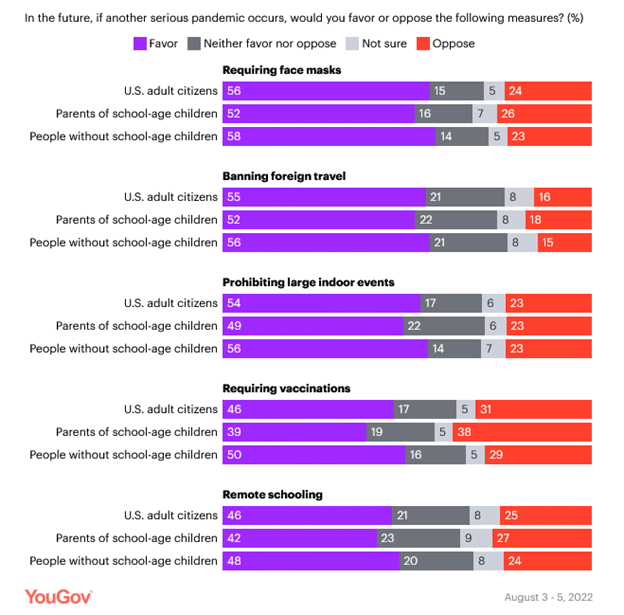
This makes parents with school-age children one of the most “controversial” groups in the country.
However, it isn’t just conservative parents who are deeply concerned about government overreach and the way the covid-19 pandemic was handled.
YouGov’s data reveals that even among Biden voters, parents of young children are less likely to support pandemic restrictions.
For example, Biden voters with young children are 14-percentage points less likely to support both face-mask mandates and remote schooling than Biden voters without young children, and parents are 15-percentage points less likely to support vaccine mandates than non-parents.
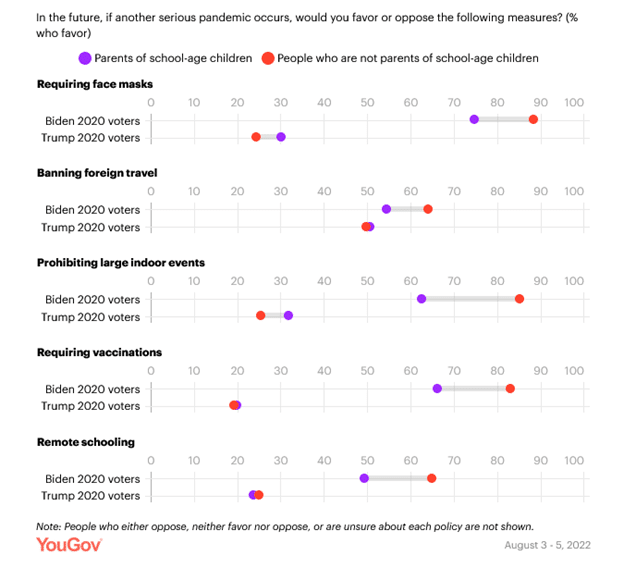
In a post-Covid-era where government mandates have divided Americans into those favored for compliance and those treated as second-class citizens, taking any kind of stand against lockdowns and mandates as a Biden voter is evidence of something stronger than politics at play.
Parents have a strong desire to create and maintain safety for themselves and their families that appears to transcend archaic political boundaries, and this desire is creating a growing chasm between themselves and the dominant political agenda.
A comprehensive 2022 study from Tulane University of 2,610 people across 10 counties shows a strong link between parents and holding conservative values on a wide range of matters including abortion, immigration, and gender issues.
Tulane Univrsity academics also incorporated archived data from an additional 400,000 individuals spanning 88 countries to come to their conclusions. The researchers revealed that controlling for other variables, parents exhibited significantly stronger conservative views than non-parents across a range of issues.
“Becoming a parent may have psychological effects that you don't expect,” said senior study author Damian Murray, associate professor of psychology at Tulane University School of Science and Engineering. “We commonly talk about how parents are going to shape their children's attitudes, but we also need to acknowledge how simply having children shapes their parents' attitudes.”
According to the authors, this parenthood factor accounts for most, if not all, of the claim that individuals grow more conservative as they age. It is in fact parenthood that spurs conservative views, not age alone, according to the researchers.
We also know that parents did indeed shift their allegiances toward conservatives between 2018 and 2022. Exit polls show that fathers supported Republicans by four percentage points more in 2022 than in 2018 while mothers shifted a substantial eight points toward Republicans.
Data comparing Trump’s share of the vote between 2016 and 2020 shows a shift among millennials in the age range to have grade schoolers of five percentage points. This is notable considering slightly older Gen X voters supported Biden at a higher rate in 2020 than they did Clinton in 2016.
Being a parent has never been more politicized, and a growing body of research shows not only that parents are more likely to support conservatives and oppose government overreach than others, but that parenthood significantly impacts political preferences in favor of conservative values.
Manzanita Miller is an associate analyst at Americans for Limited Government Foundation.
To view online: https://dailytorch.com/2023/09/are-parents-the-most-destabilizing-and-controversial-group-in-america-the-left-is-worried-they-could-be/

